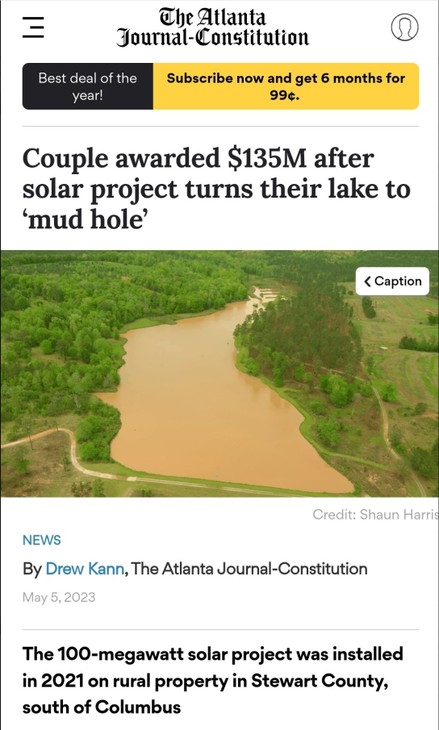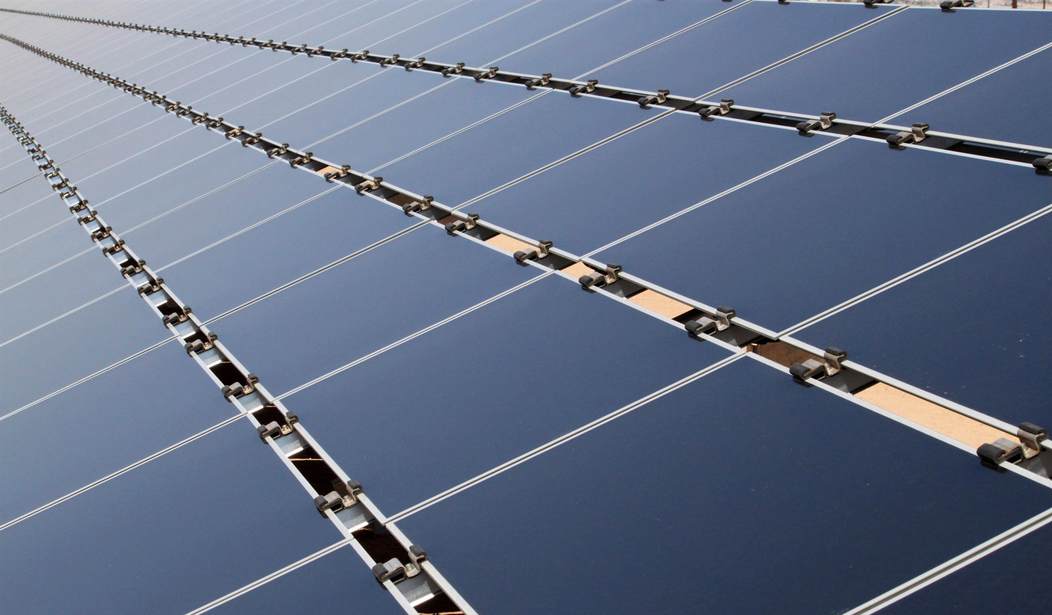How “green” is their valley?
Well, before solar companies started snapping up real estate in this relatively rural neck of the Georgia woods south of Columbus, it used to be mostly pristine hunting and fishing grounds.
The plaintiffs in the case, Stewart County residents Shaun and Amie Harris, live downstream from the solar arrays on a 1,630-acre property that includes a 21-acre trophy fishing lake. The lake was repeatedly stained bright red by sediment after construction began on the solar project, photos introduced as evidence in the case showed.
The firm responsible has built solar farms across the country, so one would reasonably assume they would about have the process on autopilot. Then again, it’s so lucrative and moving so quickly, maybe the problem is they do it automatically.
…According to the lawsuit, Silicon Ranch Corp. has developed more than 160 solar panel facilities across the country, many of which were built by IEA. At “Lumpkin Solar,” IEA cleared and mass-graded about 1,000 acres of timberland, farmland and land near the Harris couple that was previously used for recreational hunting and fishing — without installing adequate measures for erosion and sediment control, Butler said in a news release.
“The result was what one would expect — when it rained, pollution poured downhill and downstream onto the neighbors’ property, inundating wetlands with silt and sediment, and turning a 21-acre trophy fishing lake into a mud hole,” Butler said.
The companies “created, operated and maintained a nuisance … that caused sedimentation to pollute plaintiffs’ wetlands, streams and lake. The court further finds that this nuisance has continued for approximately two years unabated,” U.S. District Judge Clay D. Land said in the order.
Two years of my bass lake looking like this would piss me off, too.

Interestingly, the engineering firm who designed the erosion and sedimentation control plan were cleared of any liability in the judgement. That tells you pretty clearly the problem wasn’t with the plan, but with the execution. Did the construction costs start the exceed to budget? Did they hit a timeline crunch? For whatever reason, that fact that the plan was sound enough for the engineering firm to be cleared would indicate that serious disregard for safety and environmental practices occurred. What else wasn’t done correctly that they haven’t found or hasn’t manifested yet?
You sure have to worry.
The judge overseeing the case has ordered bucketloads of follow through and installed a special master to babysit the process.
…The new order requires the companies conduct a new hydrology study of the area; prepare an erosion, sedimentation and pollution management plan; and bolster the site’s runoff controls according to that plan. The companies must also plant permanent vegetation among the hundreds of panels on the site and hire an independent firm to sample discharges, to ensure sediment levels have returned to pre-construction levels.
The companies must also submit monthly status reports to a to-be-determined “special master,” who will oversee the process. If there is evidence of noncompliance, the judge said he could issue daily fines.
You might also think that the chief corporate beneficiaries of the electricity produced by this facility would step up in the face the obvious harm being done unto neighbors, the God-awful publicity, and the blackeye this gives to the renewables movement in general, especially considering their own corporate posturing…
…The panels were installed in 2021 through a partnership between Silicon Ranch and Walton Electric Membership Corp. Electricity from the site powers a Newton County data center owned by Meta — the parent company of Facebook and Instagram. In Georgia and other states with ample sunshine, big tech companies are turning to solar to meet their enormous energy demands and reduce their emissions of planet-warming greenhouse gases.
…and you’d be wrong.
…In addition to polluting the environment they are said to protect, solar farms often produce electricity, albeit intermittently, for a narrow but powerful segment of society. As noted by Ken Braun in RealClearEnergy, the Lumpkin Solar farm is designed to supply power to a Georgia data center run by Meta, the parent company of Facebook. Even after the developers of the ill-fated Lumpkin Solar farm were five months into their lawsuit, Braun points out, Meta’s renewable energy chief had nothing but praise for the Georgia facility.
“We thank Silicon Ranch … for their dedication to successful execution and for sharing our commitment to have a positive impact on the communities where we locate,” the Meta official said.
Meta, it is worth noting, is an enthusiastic supporter of environmental, social, and governance (ESG) investing. The company’s commitment to the “E” in ESG is called into question, however, by its participation in a solar energy project that uprooted timberland and farmland in order to build a taxpayer-subsidized solar farm that wound up polluting wetlands and soils on somebody else’s land.
Lizard Man and his flaming hypocrites.
I do not ever want to hear another lecturing, hectoring word out of any of their virtue signaling mouths ever again.
The explosion of solar throughout southern Georgia is causing qualms, even in the climate community. What’s the trade-off here? Is damage to the environment they’re already seeing worth the cost of solar, especially the huge installations?
Runoff from a growing number of giant solar farms polluting rivers and streams in rural South Georgia is becoming a major concern, an official with the state Environmental Protection Division (EPD) said Monday.
Huge solar farms of up to 1,000 acres are being built on the region’s sandy soil, which is particularly vulnerable to erosion of sediment caused by runoff from solar panels, James Cooley, the EPD’s director of division operations, told members of the Georgia House Rural Development Council meeting in Americus.
…“[What] we don’t want to be known for in Georgia is a clean energy state that has caused our rivers to become dirty,” added Jason Shaw, a member of the state Public Service Commission (PSC), Georgia’s energy regulating agency.
But, as with everything in the Green Energy shell game, there are so many dirty fingers in the financial pie. You might not like the run-off, but not only would you have to fight Silicon Ranch, its solar subsidiaries, but Shell Oil Co. and their well-connected friends.
Because of the damage in Lumpkin County, due to the reckless and negligent land grading, Shell should immediately cut a check for $135.5M to cover damages to neighbors, and apologize instead of fighting in court.
What about other solar farms in Georgia? @ChrisCarr_Ga
— Ryan Maue (@RyanMaue) May 4, 2023
Good luck with that, right?
It’s going to be like tilting at green windmills, but someone has to do it.
The more of us, the better.








Join the conversation as a VIP Member